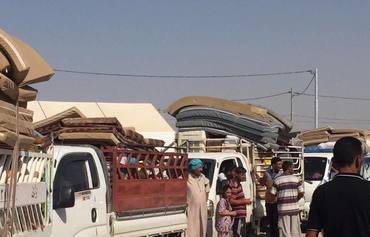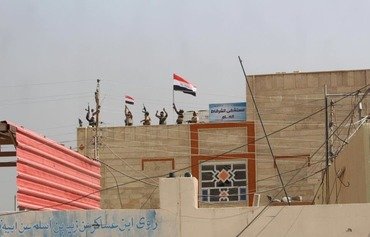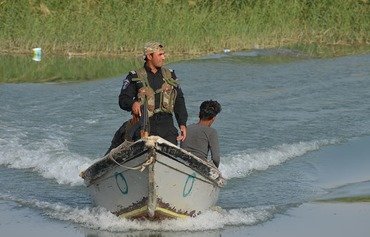Internally displaced Iraqis who have escaped from al-Sharqat in northern Salaheddine province tell Diyaruna the "Islamic State of Iraq and the Levant" (ISIL) has planted mines to prevent residents from leaving the city.
More than 12,000 al-Sharqat residents have fled the city for displacement centres near Tikrit since mid June, the Ministry of Defence said in a statement.
As Iraqi forces draw closer, ISIL has stepped up its level of aggression inside the city, displaced al-Sharqat resident Khalaf al-Fahd al-Mutlak told Diyaruna.
The group has been cutting the supply of food and medicine to all residents, with the exception of its own fighters, he said, and has been conducting executions on flimsy pretexts.
Though ISIL has been preventing people from leaving the city, he said, speaking from a displacement camp in al-Hujjaj near Tikrit, "between 1,000 and 1,500 families daily have been fleeing in secret from al-Sharqat to Tikrit".
"They have arrived barefoot with no possessions," he said. "They only wanted to save themselves and their children, so they left everything behind."
Salaheddine residents and charitable organisations have stepped in to help.
"They give us cold water and food, but the tragedy is beyond the locals' power," he said. "Food is not enough and water does not fill the displaced people's thirst, and temperatures are high, but the displacement camp does not have any means of cooling."
A mother who asked to be referred to as Umm Saji said al-Sharqat residents were suffering from a lack of all basic necessities, including medicine and infant formula.
"I had to feed my baby anything I could put my hands on," she said. "Sometimes I fed it goat or cow milk, even though it is not right for his health."
ISIL elements used to bargain with city residents, calling on them to send their sons to join the fight against the Iraqi army on their side and receive food, or be left to face their fate without any help, she added.
More than 600 die trying to escape
More than 600 people have died over the last month while trying to flee al-Sharqat for Tikrit, al-Sharqat mayor Ali Dawdah told Diyaruna.
Most of the deaths were due to improvised explosive devices (IEDs) ISIL elements had planted outside the city, he said.
A family of 11 and another family of four were among those killed by IEDs, he said, while others died of thirst as they wandered in the desert.
There have been larger numbers of displaced people since Iraqi forces liberated al-Qayyara base, he said, noting that ISIL has become more aggressive since its supply lines from Mosul to the north were severed.
The group's increased brutality in al-Sharqat might be due to the sense that its end is near with the approach of the Iraqi army, he said, adding that ISIL elements fear there will be a popular uprising against them if the army enters the city.
The harsh conditions that displaced al-Sharqat residents are facing have prompted elements within Iraqi society to help.
A relief team affiliated with the office of Shia cleric Ali al-Sistani last week sent a convoy carrying food and aid for 10,000 displaced families from al-Sharqat taking refuge in Tikrit.
The team will make two consecutive trips to provide relief to families in a number of displacement camps in Tikrit, campaign head Sheikh Alaa al-Rubaie told Diyaruna, adding that families received the aid from their Iraqi brothers with joy and with no trace sectarian sensitivities.
Registering the displaced population
The Ministry of Migration and Displacement has started to register displaced people fleeing al-Sharqat for camps in Tikrit, Deputy Minister Jassim Attiya told Diyaruna.
Many people suffered greatly before reaching the displacement camps, he said, with some forced to walk for six hours at a stretch under the scorching sun.
The ministry has provided transportation to move people from areas on the battlefront to camps near Baiji, where they are being provided with food and water, he added.
Between June 18th and the end of July, 12,000 families were displaced from al-Sharqat and nearby areas, Salaheddine operations commander Maj. Gen. Jumaa Annad said in a statement.
Their documents have been checked against a security database, he said, adding that based on information from local sources, 230 ISIL elements who tried to infiltrate the displacement camps have been arrested.

![Internally displaced Iraqis from al-Sharqat arrive in the Tikrit area. [Photo courtesy of the Iraqi Ministry of Migration and Displacement]](/cnmi_di/images/2016/08/10/5980-Iraq-sharqat-displaced-600_384.jpg)






